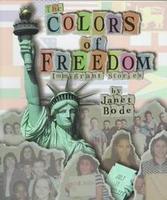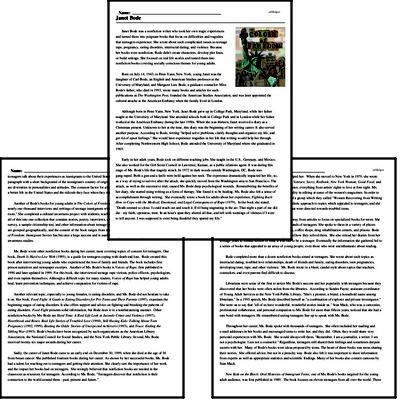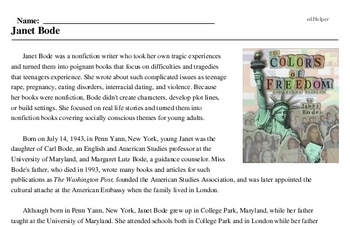Janet Bode
Janet Bode was a nonfiction writer who took her own tragic experiences and turned them into poignant books that focus on difficulties and tragedies that teenagers experience. She wrote about such complicated issues as teenage rape, pregnancy, eating disorders, interracial dating, and violence. Because her books were nonfiction, Bode didn't create characters, develop plot lines, or build settings. She focused on real life stories and turned them into nonfiction books covering socially conscious themes for young adults.
Born on July 14, 1943, in Penn Yann, New York, young Janet was the daughter of Carl Bode, an English and American Studies professor at the University of Maryland, and Margaret Lutz Bode, a guidance counselor. Miss Bode's father, who died in 1993, wrote many books and articles for such publications as The Washington Post, founded the American Studies Association, and was later appointed the cultural attache at the American Embassy when the family lived in London.
Although born in Penn Yann, New York, Janet Bode grew up in College Park, Maryland, while her father taught at the University of Maryland. She attended schools both in College Park and in London while her father worked at the American Embassy during the late 1950s. When she was thirteen, Janet received a diary as a Christmas present. Unknown to her at the time, this diary was the beginning of her writing career. It also served another purpose. According to Bode, writing "helped solve problems, clarify thoughts and organize my life, and get rid of upset feelings." She would later experience tragedies in her life that writing would help her through. After completing Northwestern High School, Bode attended the University of Maryland where she graduated in 1965.
Early in her adult years, Bode took on different teaching jobs. She taught in the U.S., Germany, and Mexico. She also worked for the Girl Scout Council in Lawrence, Kansas, as a public relations agent. It was during this stage of Ms. Bode's life that tragedy struck. In 1972 in dark woods outside Washington, DC, Bode was gang-raped. Both a gun and a knife were held against her neck. The experience dramatically impacted her life, so, as a way of trying to survive after the attack, she quickly moved from the Washington area to San Francisco. The attack, as well as the successive trial, caused Ms. Bode deep psychological wounds. Remembering the benefits of her diary, she started using writing as a form of therapy. She found it to be healing. Ms. Bode also felt a sense of accomplishment through writing. She eventually wrote a book for adults about her experience, Fighting Back: How to Cope with the Medical, Emotional, and Legal Consequences of Rape (1979). In the book she stated, "Death seemed so close. I could reach out and touch it. Evil hung stagnating in the air. That night a part of me did die - my faith, openness, trust. In an hour's span they altered all that, and left with warnings of vileness if I were to tell anyone. I was supposed to exist being thankful they spared my life."
Bode believed that writing about the experience helped her. When she moved to New York in 1979, she wrote articles for The Village Voice, Glamour, New York, Venture, Savvy, Redbook, New York Woman, Good Food, and Mademoiselle. Her writings covered a variety of topics, everything from artists' rights to love at first sight. Ms. Bode, however, became annoyed by the lack of quality in editing at some of the women's magazines. In order to solve this issue, she and other women writers joined a group which they called "Women Recovering from Writing for Women's Magazines." Bode developed a journalistic approach to topics which appealed to teenagers, and she found herself becoming more interested in topics that were directed towards troubled teens.




